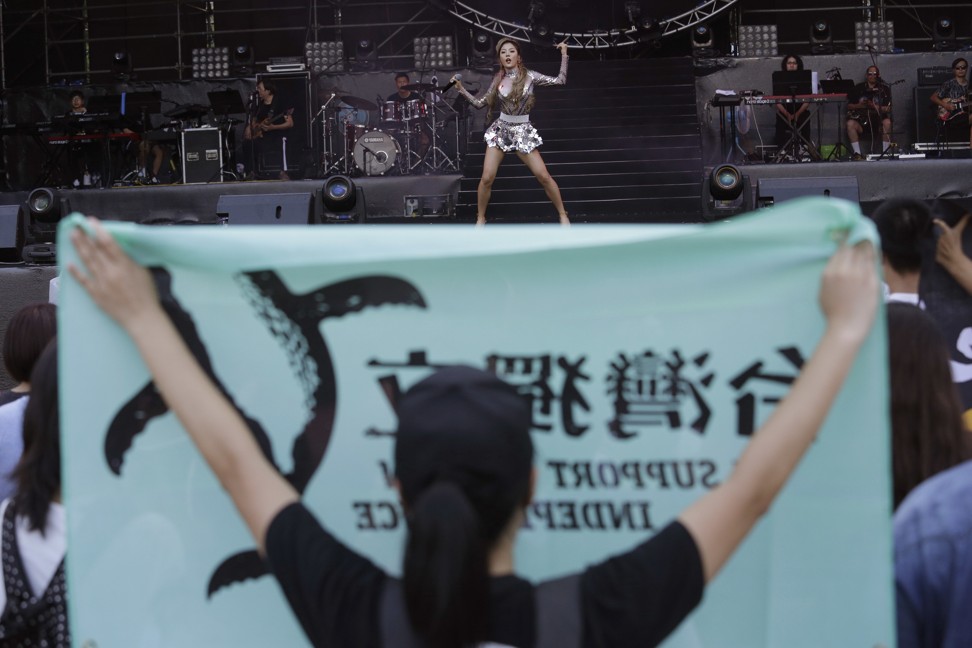
Taiwanese police still looking for fifth suspect linked to Taipei concert clash
One more person wanted for links to fighting between Taiwanese independence supporters and pro-Beijingers
Police are looking for a final suspect involved in clashes between Taiwanese pro-independence protesters and Beijing supporters at a concert in Taipei that revealed divisions over mainland China’s influence on the self-ruled island.
Beijing insists that Taiwan is part of a single Chinese nation and has vowed to take control of the island by force if necessary. It has been stepping up economic and diplomatic pressure on Taiwan’s government over President Tsai Ing-wen’s refusal to endorse Beijing’s view that both sides belong to one China.
The clashes, in which five people were injured, were the latest example of rising tensions. Ties have frayed over mainland military movements near Taiwan, slowing mainland tourism to the island and the trial of a Taiwanese activist on the mainland on vaguely defined charges of subversion.
More than 30 people, mostly students, stormed the Sing! China Music Festival stage on September 24 at National Taiwan University, city spokesman Liu Yi-ting said.
Some threw eggs at the stage and carried placards calling for “Taiwan independence” and the release of Lee Ming-che, the Taiwanese activist being tried for subversion. Some protesters shouted: “We are Taiwan National University, not China Taiwan University”.
The mainland-based organisers, including a Shanghai cultural promotion group with a focus on Taiwan, conceived Sing! China as a contest for singers and bands. Performers were from both sides of the Taiwan Strait.
Lee Chia-wei, a police detective in the Xinyi district of Taipei, said the organisers suspended the concert after the protests, but a fight between the protesters and pro-Beijing fans of the event left five people, including four students, injured, one with a broken finger. Some of the attackers used bats, he said.
“They reported a difference in political views, and then their arguments led to fighting,” Lee said.
The suspects could be charged with assault and making threats. Police are still looking for one more person and are investigating the cause of the violence, he said.
Shane Lee, a political scientist at Chang Jung Christian University in Taiwan, said the protesters were probably concerned that the concert was part of China’s “soft power” diplomacy in Taiwan targeting the island’s youth.
Chao Chien-min, from the Chinese Cultural University in Taipei, said more upsets like the concert protest were inevitable because Taiwanese are worried about the mainland’s growing economic clout alongside its insistence that it reunite with the island.
Protesting students “might think more exchanges with China are rather dangerous,” he said. “They will wonder whether economic ties will be combined with politics.”
In Beijing, a spokesman for mainland’s Taiwan Affairs Office last week criticised the pro-independence protesters, saying most Taiwanese have long supported interactions between people from both sides.
“This was a simple and normal music exchange activity loved by young people across the strait,” Ma Xiaoguang told reporters, saying the protesters had politicised the event.
Relations between the mainland and Taiwan have cooled since May 2016, when Tsai took office in Taipei. Beijing has shown its discontent with her by sending an aircraft carrier around the island, forming ties with two countries that once recognised Taiwan diplomatically and scaling back visits by mainland tourists.
The president told her Democratic Progressive Party at a congress on September 24 that it must come up with new ways of interaction with the mainland. Party members should neither “irrationally hate” nor “blindly please” it, she said.


